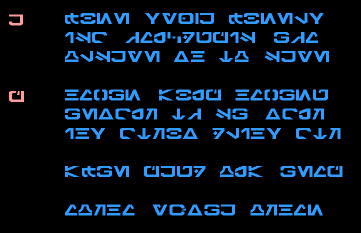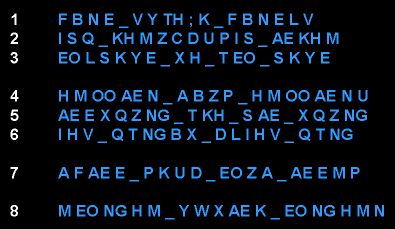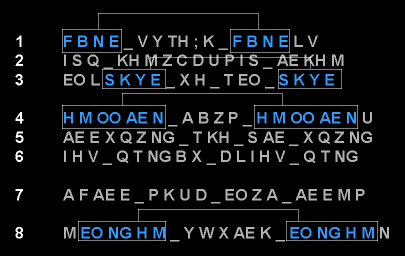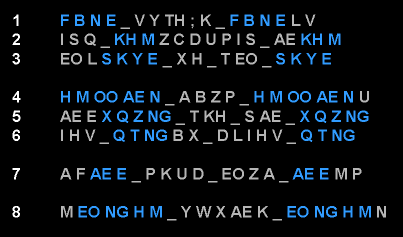Disclaimer:
|
|||||||||||||||||
 |
||
What Does That Screen Say?
The DiscoveryI recently read the online interview with Episode II "holographic artist" Philip Metschan at starwars.com. In the interview, Metschan discusses a font that Joe Johnston had originally created back in 1976. The interview included a link to this image:
I immediately realized it was the inspiration for the font seen on "the screen". Perhaps it was even a plain version of the font that appeared on Tarkin's viewscreen as the Death Star targeted the rebel base on Yavin IV. So I printed it out to mull over, and then I happened to turn it upside down . . . and my brain went CLICK:
As you can see, this is THE font used on "the screen". Sure, it's a few letters short, but it's a match. It's even better than Aurebesh - no offense to Stephen Crane. Now we can clearly see the characters that we had been squinting at for years. It really makes you wonder what else lurks in the catacombs of the Lucasfilm archive. Anyway, this new discovery gave me a renewed determination to tackle "the screen". So after several years, I again looked at what I had, and I took a close look. Here's a recreation of the screen, made using my own Galactic Basic font.
It's hard to really analyze this text well with all these strange characters, so I translated it into English again, even if it is gibberish. (For now, forget about the red bullets in front of the first two paragraphs.) Below you'll see I've put a space between every letter, so it's easier to see the "double letters" that some of the Aurebesh characters stand for, like "th" and "ae". Because of all the spaces I've added, the actual spaces between the words are marked as "_", and I've numbered the lines for easy reference. Bear with me; all this is going somewhere.
Like I said, this is gibberish. What matters though are the patterns of the words and the spaces (marked as "_"). Using the spaces, you can break down words and look for certain things. So I looked for words with three letters, hoping to maybe decode an "and" or "the". Once I had identified a few candidates, I starting looking for five-letter words like "Vader" or "Endor" to see if the letters matched up. After a while of not getting anywhere, I noticed something new in line #1. The "fbne" sequence appears at the beginning and end of the line. At first I thought that maybe these were things that rhymed, but then I saw repeating sequences in lines 3, 4, and 8.
I looked a little closer and saw repeating sequences in all of the lines.
And then it hit me. What, you ask? Well, before I can go there, let me explain by using an example. Continue on to Page 3: A Quick Lesson
|
This
page last modified on
8/25/2006
Return to Top





